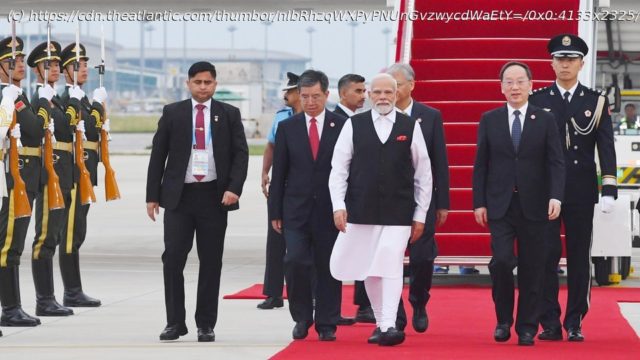To see how the president is losing ground to Beijing, consider his disastrous relationship with India.
Most Republicans and many Trump-administration officials believe that the stakes of America’s competition with China are all but existential. Apparently, Donald Trump is not among them. The president talks about China as an economic rival but rarely as a strategic one—a view neatly encapsulated by his decision last month to ease export controls on advanced chips, which granted Beijing a boost in the AI race in exchange for a cut of the resulting sales.
Now Trump seems to fear doing anything that might jeopardize the prospects of a summit and trade deal with China’s leader, Xi Jinping. On Truth Social this week, the president said that he’ll be speaking with Xi on Friday and suggested that a deal on TikTok was imminent. He concluded the post by asserting that his relationship with Xi “remains a very strong one!!!”
Trump world has long disagreed on how to deal with China. In Trump’s first term, for example, then–National Security Adviser H. R. McMaster produced a strategy that centered on competition with China and Russia. Even while introducing that plan, however, Trump emphasized the need to build a “great partnership” with Beijing and Moscow. China hawks nevertheless made progress, succeeding in adding Chinese technology firms to America’s trade blacklist and banning investment in companies with links to China’s military, among other measures.
The China hawks have been sidelined in the second Trump administration, leaving the president’s money-minded view of China unchecked. Consider his approach to TikTok. Last year, Congress passed legislation to shut down the platform by this past January if its Chinese parent company, ByteDance, did not divest. Instead, Trump issued rolling extensions, effectively ignoring the law and the national-security concerns that Congress had raised. The terms of the deal Trump hinted at are unknown. But some initial reporting suggests that it could resemble previous proposals that relied on inadequate work-arounds, such as requiring ByteDance to “license” its algorithm to an American company rather than relinquish control of it. If Trump’s plan proves to be a rehash of those earlier ones, then it may be little more than a capitulation to Beijing.
The administration is also reportedly drafting a new defense strategy that prioritizes concerns in the Western Hemisphere over the dangers that Beijing poses. But the most striking example of Trump’s failure to take China seriously is his demolition of America’s relationship with India.
Washington has so far thwarted Beijing’s ambitions to dominate the Indo-Pacific by forging alliances and partnerships in the region. These relationships have become America’s key strategic advantage over China, and perhaps the most important in this regard was to be the one with India. For 25 years, Republicans and Democrats were committed to deepening ties with Delhi, which has long had suspicions about America but is even more concerned about China’s rise. Under the Biden administration, U.S. cooperation with India reached a historic high, yielding agreements on defense production, technology, and civil nuclear regulations.
Earlier this year, Trump appeared poised to continue America’s long-standing approach to India and build on his personal relationship with Prime Minister Narendra Modi. In February, Modi became one of the first foreign leaders to visit Trump in the Oval Office, and the two issued a joint statement outlining dozens of issues on which they pledged to work together. After Trump announced his “Liberation Day” tariffs in April, many observers expected India to be one of the first nations to reach a trade deal with him.






